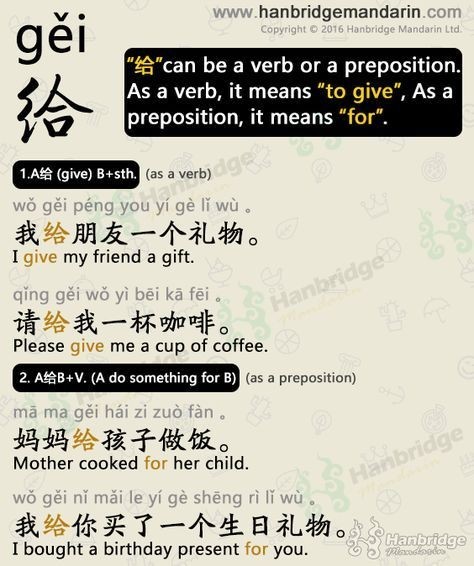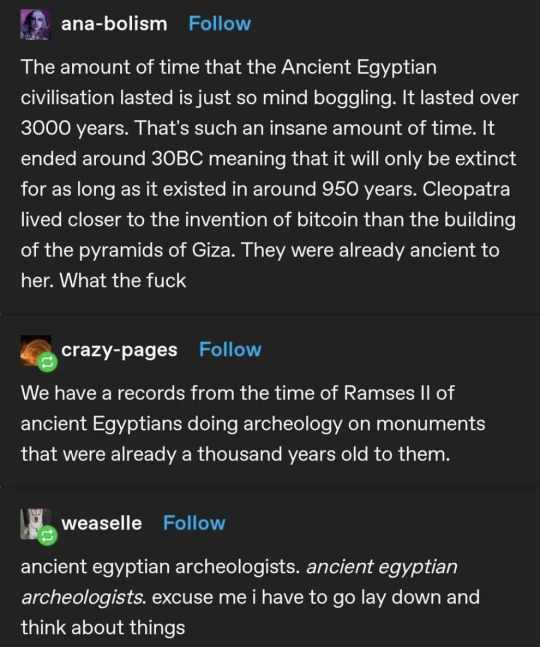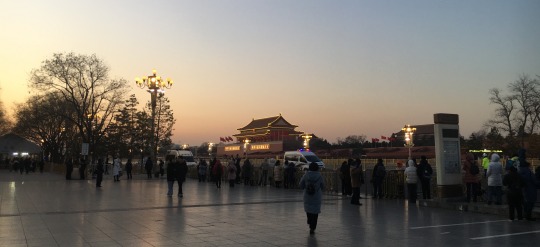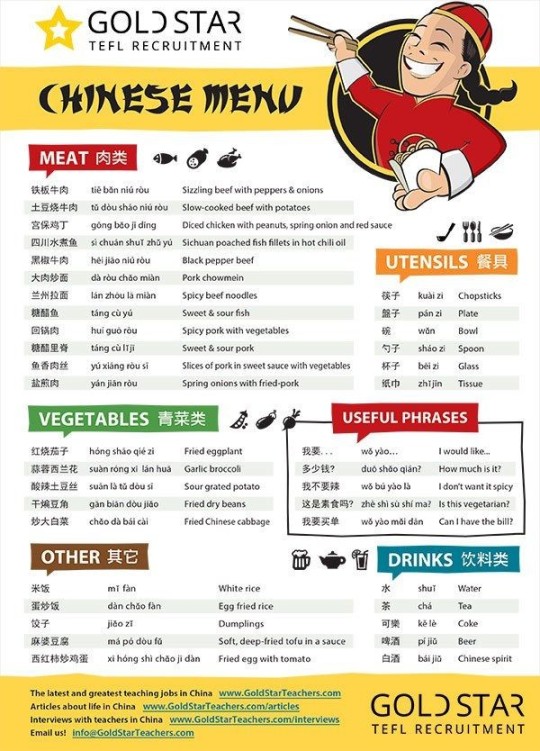#mandarin vocabulary
Text
Speak DECENT CHINESE in 4 months - 8 easy tips
______
1. Have someone to guide you to get good pronunciation habits. It is almost impossible to re-learn bad habits later so make sure you get your pronunciation right from the beginning. I mean the pronunciation of the sounds, not the tones. Tones take more time to get used to and you can't rush it - but try the best you can. Some tutors don't bother too much about the pronunciation so make sure you find someone who is strict about that, you will be grateful later. Also get confident in pinyin, you will need it.
2. Understand the composition of the sentences. The word order is super easy and it stays the same all the time (the question and informative sentences have the same word order). I have a formula for the word order but I won't reveal it here, it is one of the secrets I keep for my students and people who use my materials.
3. Understand that there are no tenses in the sense we think about them in English and other languages. Learn to express future, potential future, finished action, change of state, experience in the past and circumstances of the event. See the difference between action verbs and verbs of state.
4. Learn to use modal verbs and conjuctions.
5. Build usable vocabulary based on the fact that everything in Chinese is interconnected.
6. Understand 就, 才,的 and 得
7. Don't learn grammar rules and words separately. Learn functional practical sentences that will serve you as examples of the grammar structures (then you just need to change the words in these sentences).
8. Develop your listening skills - that is very important. For that there are Youtube channels and podcasts on Spotify (and in my materials the audio part also plays an important role). You can listen to Chinese radio stations just to get the feeling of the language.
______
After 3-4 months you should feel pretty confident in normal conversations if you study regularly under competent guidance.
______
R-evolutionary learning materials and resources: https://linktr.ee/chineseffect
MAGIC PLAYBOOK for beginners
#learn chinese#learn mandarin#chinese langblr#mandarin langblr#edublr#mandarin#chinese#mandarin edublr#langblr#chinese vocabulary#mandarin chinese#chinese edublr#learning mandarin#learning chinese#study chinese#mandarin vocabulary#study mandarin#汉语#chinese studyblr#beginners chinese#chinese for beginners#learning tips#chinese tips#mandarin tips
241 notes
·
View notes
Text

Guys, I swear the source website of this picture had helped me out so much both when I started learning chinese and now!
Link:
I don't usually recommend pinterest to find useful websites but I did find this website there somehow lol. Istg half the links of pinterest are unavailable or something.
#langblr#chinese langblr#mandarin langblr#mandarinblr#chineselangblr#chinese vocab#mandarin vocab#chinese vocabulary#chinese language#chinese studyblr#mandarin vocabulary#mandarin chinese#mandarin studyblr#mandarin#learn chinese#study chinese#chinese study#learn mandarin#study mandarin#learning mandarin#studying mandarin#langblog#language learning#languageblr#learning languages#zhongwen
202 notes
·
View notes
Text
"Building Your Mandarin Vocabulary: 10 Words to Get You Started"
Learning a new language can be challenging, but it can also be a rewarding and enriching experience. If you're interested in learning Mandarin, here are ten useful words to get you started.
1. 全部 (quán bù) - This word means "all" or "entire". For example, you can say "全部的书" to mean "all the books".
2. 起 (qǐ) - This word means "start" or "begin". You can use it to indicate the beginning of an action or a process. For example, you can say "从起点走到终点" to mean "walk from the starting point to the end point".
3. 这样子 (zhè yàng zi) - This phrase means "like this" or "in this way". You can use it to describe something or to explain how something is done. For example, you can say "这样子做" to mean "do it like this".
4. 儿子 (ér zi) - This word means "son". It can be used to refer to your own son or someone else's son.
5. 感情 (gǎn qíng) - This word means "emotion" or "feeling". You can use it to talk about how you feel or to describe someone else's emotions.
6. 永远 (yǒng yuǎn) - This word means "forever" or "eternally". It can be used to describe something that will last forever or something that is timeless.
7. 般 (bān) - This word means "general" or "typical". You can use it to describe something that is common or typical for a particular group or situation.
8. 有 (yǒu) - This word means "have" or "there is". It can be used to indicate the existence of something or to describe possession.
9. 带来 (dài lái) - This phrase means "bring" or "take". You can use it to describe bringing something with you or taking something somewhere.
10. 伊拉克 (Yī lā kè) - This is the Mandarin transliteration of "Iraq". It can be used to refer to the country or to things related to the country.
I hope these words and phrases will be useful as you begin your journey to learn Mandarin. Remember to keep practicing and be patient with yourself – learning a new language takes time and dedication.
Could you come up with a title for this blog post?
"10 Essential Mandarin Words for Beginner English Speakers"
#Mandarin#Mandarin vocabulary#Mandarin for beginners#Essential Mandarin words#Beginner's guide to Mandarin#Mandarin language learning#Mandarin phrases#Mandarin words#Mandarin language#Learn Mandarin#ChatGPT#伊拉克#带来#有#般#永远#感情#儿子#这样子#起#全部
30 notes
·
View notes
Text
Writing “Chinese” in Chinese
Here is a little bit of information that I thought would be great to share!
So whenever I’m writing my tags or trying to introduce myself, I think about how I would actually write the name of my target language. So for example, to say “I am learning Spanish” I would write “ Estoy aprendiendo español”. The translation is simple. But for Chinese, that’s not the case.
There are differences in Chinese as it’s written versus when it’s spoken. There’s also differences between Mandarin Chinese and Cantonese Chinese. It was interesting trying to make sense of which ones to use and when, so I looked it up! I used several resources, which will be linked at the end.
Below, I have the noted words, with both Mandarin and Cantonese pinyin and jyutping to showcase how it’s pronounced. There are also detailed explanations as well. Anyway, here it goes!
Chinese (person): 中国人。 Zhōng guó rén / zung1 gwok3 jan4
The main reason why I placed this here is due to how English as a language works. When you look up how to say Chinese in Chinese, this will pop up. It’s only due to the fact that English uses words such Chinese, Spanish, etc to describe the language, people, and objects pertaining to that country. So we use “Chinese” for both “I am Chinese” and “I speak Chinese”. This not the case for other languages though. They have separate words for the language and the people. So in Chinese, to that say a Chinese person you use “中国人”.
This breaks down in multiple ways. 中 means middle and it’s commonly used to as an indication for China. 国 means country so when used with 中, it means middle country, or China. When having 人 , which means person, it becomes the meaning given above. All of this is important to know as 中 and the other characters will be used with this context in mind.
Chinese (written): 中文 zhōng wén / zung1 man4
This is mainly for Chinese as the written language. It can apply to all the languages under it (so mandarin, cantonese, etc). It can also be used for the spoken Chinese as well. This would be the simplest form to use when wanting to say “I’m learning Chinese.” This would not help with specifics though.
This is written like this due to 文 meaning writing, character, script, and language. With 中 meaning China, the two form together to create the meaning of “the written language of China”, “the Chinese written language,” or even a simple “Chinese writing”. It also can be seen as “Chinese Language” as well. This is why even though you can use this as a simple “Chinese”, it carries the idea of writing in Chinese.
In general, if you don’t mind the vagueness of 中文, then you can use it. But if you want to be specific in whether your learning Mandarin, Cantonese, etc, then use the ones below.
Mandarin Chinese (Han People): 汉语 hàn yǔ / hon3 jyu5
This is used to say the language of the Han people, which make up most of the Chinese population. This is understood to mean Mandarin and is commonly used for it. It is also used by teachers as well so while 中文 is used by everyday people to say Chinese, 汉语 might be used in schools to specify Mandarin.
This is broken down by 汉 meaning the Han people, an ethnic group that makes up most of the population in China, and 语 meaning language, tongue, or expression. This means that with the two combined, it brings the idea of “Han language” or “language of the Han people”. It is used more often to refer to the spoken language of Chinese, such as Mandarin.
Small note: I went back through to double check this post and it seems that for some speakers, this actually does refer to other dialects/languages. Some have noted that people can use this to also mean Cantonese as well, although several articles go against this.
Mandarin Chinese (Common Language): 普通话 pútōng huà / pou2 tung1 waa2
This is used to also say Mandarin Chinese, but through the idea of a “common language” or “common dialect”. It’s from the idea of speaking in the common dialect, which in China and learning settings, would be Mandarin. This is how the Chinese government puts their official language.
This can be broken down by 普 meaning universal, general, widespread, 通 meaning pass through, common, communicate, and 话 meaning speak, talk, communicate, dialect. This all comes together to form the idea of a common dialect.
I am curious if this meaning for Mandarin Chinese changes depending on environment. If one is in an environment where most speakers speak Cantonese, would 普通话 mean Cantonese instead? Would love to know!
Mandarin Chinese (Taiwan): 国语 guóyǔ / gwok3 jyu5
This version is used primarily in Taiwan. It means “language of the country” or “country language”. This doesn’t explain much about the exact language is it, but since Mandarin is spoken in Taiwan, using this word to describe Mandarin makes sense. It’s the idea of speaking the country or national language, aka Mandarin.
This word can be broken down by 国 and 语。Both of which have been explained above.
Mandarin Chinese (Overseas): 华语 huáyǔ / waa4 jyu5
Now in in the articles I looked at, they note that even in overseas communities there are different words for Mandarin. This version is used mainly in South East Asian countries, such as Singapore and Malaysia. This time though, the ideas behind the characters are a bit more complex in nature.
The characters can be broken down by 华 and 语. While 语 has been explained before, 华 carries a much more complicated history. Just as 中 can mean “Middle” while also being used to mean China, 华 does the same. 华 means splendid, magnificent, and flowery, but it’s not this meaning that 华语 is using. That is due to 华 being used in the word 华夏, which is a concept of the Chinese civilization and nation. It’s an awareness of the Han people and their ancestors.
夏 is the name of the very fist Chinese Dynasty, the one that formed the country. Having 华夏 together brings this idea of a great dynasty and the importance it holds for Chinese communities and their shared history. So for Chinese people in places such as Singapore and Malaysia, it’s way for them to connect to their ancestry. They can also connect with their language through this, hence 华语。
This all comes together to bring the idea of Chinese people in Singapore speaking the language of their people or ancestors, which in most cases is understood to be Mandarin. The language of their Han ancestors, 华语,is Mandarin.
Mandarin (Officialese): 官话 guān huà / gun1 waa2
This one is very straight forward, but is also used in many different contexts. 官 means official, bureaucratic, or government. When this is combined with 话, it takes on the meaning of official language, which in China is Mandarin. This isn’t it’s only meaning though. It can also be used to say bureaucratic language or even used to mock or joke about “official language” or “officialese”. So be mindful that this isn’t used to only mean Mandarin.
Mandarin (Northern Dialect): 北方方言 běi fāng fāng yán / baak1 fong1 fong1 jin4
This one is actually quite simple! The first part of this is 北方, which means north or northern. The second part, 方言, means topolect, which is sorta like a dialect. This very easily translates into northern topolect/dialect. This encompasses all the dialects of northern, north eastern, and south westward China into one thing of “Mandarin”. This is only really used in linguistic circles. It wasn’t in the main articles and only brought up in terms of linguistics so using this is not very important. It’s only for technicalities.
So far this is all that I have found for Mandarin but, there are also several ways to say Cantonese as well.
Cantonese (Hong Kong): 粤语 yuèyǔ / jyut6 jyu5
This word is mainly used in Hong Kong. This variation is also complex in it’s meaning as it brings older ideas of the southern provinces in China. 语 has already been explained previously but 粤 carries much more history. When looking up 粤, it doesn’t show much detail other than just “Cantonese” or “Guangdong or Gaungxi province”. But if you look at the radical used in the character, this brings more information.
In the character 粤, there is the radical 米. This radical has the meaning of husked rice or grains of rice. This brings about the ideas of 粤 relating to rice, and in turn the language of things associated with rice. This is amazing because rice was traditionally cultivated in southern china. Rice was made in the south due to the warm and wet climate. Now, the south is associated with Rice. There is even an on going stereotype that southern Chinese people love rice and rice related things.
So Cantonese, which tends to be spoken in southern China, is referred to as 粤语, a word that is related to rice. It all comes together in this cool way that otherwise would not have been known without going into the radical.
Cantonese (Mainland China): 广东话 guǎngdōnghuà / jim2 dung1 waa2 or 6
This version is used by those in mainland china. The word gains its meaning from the region of 广东, which is a province in southern China where most of the population speaks Cantonese. (Where my Chinese ancestors are from :D ) Because of this, Cantonese is referred to as 广东话, or “Guangdong Language” or “Guangdong Dialect”.
This is very simple to break down as 话 was explained previously. 广东 is simply the name of the region in southern China. The character 广 means wide, extensive, and broad. The character 东 means east, host, or owner. I’m not sure on the history of why the southern provinces are named this way, but it is interesting to know. I will probably make a post explaining this history when or if I find I out.
Cantonese 白话 báihuà / baak6 waa2
This version of saying “Cantonese” is very very informal. It’s a term that’s very colloquial. It’s reportedly not used in Hong Kong, but can still be used in Mainland China. It’s a term that has many other uses and meanings so it’s not wise to use it only to say “Cantonese”. It can mean gossip, chit-chat, or even baseless claims. This is all derived from it’s characters.
白 means white, but just like many other languages, white isn’t only to say the color. 白 is also used to mean blank, clear, or plain. With this, when combined with 话, it gives off the idea of speaking very plainly and/or having nothing of value to your talk in either gossip or no evidence to back up claims.
It’s versatile in it’s use due to this, but those who use it to mean Cantonese are probably using it to make Cantonese seem like the “common” or “plain” language used. It’s the same idea of 普通话, where it’s the common tongue or dialect. Or at least that’s how I’m interpreting it.
This is all I have in terms of how to say “Chinese” in Chinese. I realize only after making this post that I did not use traditional characters at all. This would only change the appearance of the characters, not the pronunciation or use of the characters. Anyway, besides this I hope this post proved to be helpful and allowed many of you to learn something new! My sources are now listed below!
Sources:
https://goeastmandarin.com/how-say-chinese-language-mandarin-chinese/
https://www.duchinese.net/blog/91-how-to-say-chinese-in-chinese/
https://www.tutormandarin.net/en/5-ways-how-to-say-chinese-in-chinese/
https://www.quora.com/How-do-you-write-Cantonese-in-Cantonese
https://www.quora.com/What-is-the-Mandarin-word-for-Mandarin
https://www.mdbg.net/chinese/dictionary
https://www.pleco.com/
#langblr#language leanring#peachycanton#chinese#chinese langblr#mandarin chinese#cantonese chinese#cantonese#Mandarin Vocabulary#Cantonese vocab#中文#汉语#普通话#国语#华语#官话#北方方言#粤语#广东话#白话#long post#cantonese vocabulary#mandarin vocab#mandarin langblr#chinese vocab#Chinese Vocabulary#so many tags omg#this took me days and i'm so tired#i just kept finding more things to add to my notes#please correct me if i'm wrong about anything
41 notes
·
View notes
Text
狭隘//狹隘 xia2 ai4 narrow, tight, narrow-minded, lacking in experience
↳ 宽度、范围窄小;形容见识短浅,心胸、气量不宽大//寬度、範圍窄小;形容見識短淺,心胸、氣量不寬大
战士们沿着狭隘的山道登上山顶。//戰士們沿著狹隘的山道登上山頂。
心胸狭隘的王后总是嫉妒那位美丽的公主。//心胸狹隘的王后總是嫉妒那位美麗的公主。
他这个人心胸很狭隘,动不动就生闷气。//他這個人心胸很狹隘,動不動就生悶氣。
落拓 luo4 tuo4 down and out, in dire straits, unrestrained, unconventional
↳ 穷困不得志;豪放,豪迈,不拘束//窮困不得志;豪放,豪邁,不拘束
杜牧是一位落拓不羁的诗人。//杜牧是一位落魄不羈的詩人。
一双凤眼正落拓不羁地扫视我。//一雙風眼正落拓不羈地掃視我。
因为他那落拓不羁的性格,所以今年已经35岁了,仍然是个单身汉。//因為他那落拓不羈的性格,所以今年已經35歲了,仍然是個單身漢。
牵扯//牽扯 qian1 che3 to involve, to implicate
↳ 牵连拉扯;发生关联//牽連拉扯;發生關聯
这件事也牵扯到了你。//這件事也牽扯到了你。
这个问题实在牵扯太广,决策部门一时也束手无策。//這個問題實在牽扯太廣,決策部門一時也束手無策。
不管发生什么,请你相信我绝不会牵扯到你。//不管發生什麼,請你相信我絕不會牽扯到你。
诋毁//詆毀 di3 hui3 to vilify, to slander, vilification
↳ 恶意毁谤、破坏//惡意毀謗、破壞
你应该停止诋毁你的助手。//你應該停止詆毀你的助手。
他是一个君子,他不会暗中诋毁我。//他是一個君子,他不會暗中詆毀我。
她经常因诋毁对手而受到指责。//她經常因抵譭對手而受到指責。
所致 suo3 zhi4 to be cause by
↳ 由于某种原因而造成的//���於某種原因而造成的
他们认为这是植物生理过程所致。//他們認為這是植物生理過程所致。
这次事故是由于疏忽所致。//這次事故是由於疏忽所致。
许多国际间的误会就是彼此不能互相了解所致。//許多國際間的誤會就是彼此不能互相了解所致。
芥蒂 jie4 di4 an obstruction, barrier, grudge, ill-feeling
↳ 细小的梗塞物;比喻积存在心中的怨恨和不快//細小的梗塞物;比喻積存在心中的怨恨和不快
同事间心存芥蒂真的会引发一些问题。//同時間心存芥蒂真的會引發一些問題。
我们以前是仇人,但现在已不存芥蒂。//我們以前是仇人,但現在已不存芥蒂。
站起来以后,叶孤风心中对自己输掉的事情还是有些芥蒂的,但胜败乃兵家常事,他也不是那种输不起的人。//站起來以後,葉孤風心中對自己輸掉的事情還是有些芥蒂地,但勝敗乃兵家常事,他也不是那種輸不起的人。
自首 zi4 shou3 to give oneself up, to surrender (to the authorities)
↳ 自行投案,承认罪责//自行投案,承認罪責
由于受不了良心的谴责,他决定投案自首。//由於受不了良心地譴責,他決定投案自首。
犯罪分子的路有两条:一条是投案自首,一条是越陷越深,非此即彼。//犯罪分子的路有兩條:一條是投案自首,一條是越陷越深,非此即彼。
到警察局去自首,你应该知道亡羊补牢的重要性。//到警察局去自首,你應該指導亡羊補牢的重要性。
谩骂//謾罵 man4 ma4 to hurl abuse, to deride, to call somebody names
↳ 肆意乱骂//肆意亂嗎
面对评论中潮水般的谩骂,她能岿然不动。//面對評論中潮水般的謾罵,她能巋然不動。
他破口谩骂一气。//他破口謾罵一氣。
她用连珠炮似的谩骂来攻击他。//她用連珠炮似的謾罵來攻擊他。
强悍//強悍 qiang2 han4 valiant
↳ 强横勇猛//強橫勇猛
面对那个强悍的大叔,她毫不畏惧,据理力争,看得我惊心动魄。//面對那個強悍的大叔,她毫不畏懼,據理力爭,看得我驚心動魄。
他们个个都是身材魁梧、强悍有力的人。//他們個個都是身材魁梧、強悍有力的人。
瑞秋相当强悍,她谁都不怕。//瑞秋相當強悍,她誰都不怕。
保佑 bao3 you4 to bless and protect, blessing
↳ 指神力的护卫帮助,神灵庇护和帮助//指神力的護衛幫助,神靈庇護和幫助
有病要找医生,神仙是保佑不了的。//有病要找醫生,神仙是保佑不了的。
牧师对教徒们���:“愿上帝保佑你们!”//牧師對教徒們說:”願上帝保佑你們!“
他在神像前打躬作揖,希望可以保佑他女儿能顺利度过难关。//他在神像前打躬作揖,希望可以保佑他女兒能順利度過難關。
#langblr#mandarin langblr#mandarin chinese#learn mandarin#chinese langblr#learn chinese#mandarin vocabulary#chinese vocabulary#mine#m vocab
34 notes
·
View notes
Text
[English->Mandarin] Egyptian History Vocabulary - Color Coded Translation
Image credit to @ana-bolism @crazy-pages @weaselle

—
古埃及
gǔ āi jí
古埃及
ㄍㄨˇㄞㄐㄧˊ
Ancient Egypt
and
古代埃及
gǔ dài āi jí
古代埃及
ㄍㄨˇㄉㄞˋㄞㄐㄧˊ
Ancient Egypt
—
克莉奥佩特拉
kè lì ào pèi tè lā
克莉奧佩特拉
ㄎㄜˋㄌㄧˋㄠˋㄆㄟˋㄊㄜˋㄌㄚ
Cleopatra
—
金字塔
jīn zì tǎ
金字塔
ㄐㄧㄣㄗˋㄊㄚˇ
Pyramid
—
吉萨金字塔群
jí sà jīn zì tǎ qún
吉薩金字塔群
ㄐㄧˊㄙㄚˋㄐㄧㄣㄗˋㄊㄚˇㄑㄩㄣˊ
The pyramids of Giza
(Literally: pyramid Giza group)
—
拉美西斯二世
lā měi xī sī èr shì
拉美西斯二世
ㄌㄚㄇㄟˇㄒㄧㄙㄦˋㄕˋ
Rameses II / Rameses (the) 2nd
—
考古学
kǎo gǔ xué
考古學
ㄎㄠˇㄍㄨˇㄒㄩㄝˊ
NOTE: 考古 is the shortened version of this word
Archeology
—
考古家 & 考古学家
kǎo gǔ jiā & kǎo gǔ xué jiā
考古家 & 考古學家
ㄎㄠˇㄍㄨˇㄐㄧㄚ & ㄎㄠˇㄍㄨˇㄒㄩㄝˊㄐㄧㄚ
Archeologist
—
Please correct me if I made a mistake
#chinese langblr#chinese lesson#learn chinese#mandarin langblr#chinese vocab#chinese to english#english to chinese#mandarin vocab#mandarin vocabulary#chinese vocabulary#color coded translation#egyptology#egypt history
6 notes
·
View notes
Text
chinese art compliments/replies
as a follow up to my post on online drawing vocab, here is a collection of comments you can use to compliment others' art :-)
the basics
喜欢 [xǐhuān] - i like it
好好看 [hǎohǎo kàn] - looks good
厉害 [lìhài] - amazing
好漂亮/帥/美 [piàoliang/shuài/měi] - so pretty/handsome/beautiful
太有才了 [tài yǒu cáile] - so talented
(similarily, 画画天才 => drawing genius)
好神 [hǎo shén] - godly
神迹 [shén jī] - miraculous
仙品 [xiān pǐn] - high-quality product
好鮮活 [xiān huó] - vivid/lifelike
it’s cute
可爱晕了 [kě'ài yūnle] - so cute i fainted
可爱死了 [kě'ài sǐle] - so cute I died
可爱鼠了 [kě'ài shǔle] - so cute I died (in a cutesy/meme way)
卡瓦 [kǎ wǎ] - kawaii
好米 [hǎo mǐ] - so cute/beautiful
太萌了 [tài méngle] - so adorable (originating from japanese word moe - 萌え, lots of different meanings, but mostly refers to happiness you feel when you see something really cute), can be used like 萌到我了/被萌晕/心被萌化了
basically any XX死了/XX暈了/XX炸了 comment works
expletives
我去 [wǒ qù] - damn
卧槽/我草/wc [wò cāo] - censored vers of 我操 => oh fuck
牛逼 [niú bī] - (fucking) awesome, usually just use 牛
exclamatives
哇/哇塞 [wasāi] - wow
啊啊啊啊 - aaaaaa
哇啊啊啊 - wahhhh
responding to compliments
被老師跨了,能力暴增 [kuà...bào zēng] - (if responding to commenter who's also an artist) compliments from teacher make my ability surge
爱您主人 - love u op (主人 refers to original commenter), can also just use 愛你
嘿嘿谢谢喜欢 - hehe ty for liking
比心 [bǐ xīn]- finger heart
送愛 [sòng ài] - sending love
亲亲 [qīn qīn] - kiss kiss
questions
可以当头像吗 [tóuxiàng] - can I make it my pfp
可以自印吗 [zì yìn] - can I print it out
可以收集吗 [shōují] - can I save it
求原图 [qiú yuán tú] - original image pls
这么时候接稿 [jiē gǎo]- when will you open commissions
misc.
抱走/拿走 [bào/ná zǒu] - carrying/taking it away
蹲蹲 [dūn dūn] - if someone has posted a WIP, waiting (for the finished piece/shop listing), direct trans. = squatting
#chinese#mandarin#chinese language#studyblr#langblr#chinese langblr#mandarin langblr#chinese vocabulary#tunastudies
309 notes
·
View notes
Text
The 然's
突然,虽然,忽然. and the other 然's can often get mixed up, so here's a quick explanation of some of the most common ones!
突然 (Túrán): This means suddenly or unexpectedly
居然 (Jūrán): This kind of means suddenly, but more in the sense of "surprisingly" or to suggest disbelief at something that happened.
忽然 (Hūrán): This also means suddenly or unexpectedly, but it has a more stronger connotation.
既然 (Jìrán): This is a conjunction meaning "since" or "now that"
既然the weather is great, let's go out!
既然 you aren't busy, let's go watch a movie.
不然 (Bùrán): This means "otherwise" or "or else";
You should study, 不然 you won't do well on the exam.
虽然 (Suīrán): This means although or even though.
虽然 I'm not good at singing, I still like to go to the karaoke.
当然 (Dāngrán): 当然 means certainly or definitely and can be used as a reply:
Can you help me with A? 当然!
自然 (Zìrán): This can mean nature or naturally.
China's 自然 is very beautiful.
She speaks Chinese 得很自然.
仍然 (Réngrán): This can mean "still" or "yet".
I仍然 haven't read that book.
依然 (Yīrán): Similar to 仍然, this also means still" or "yet" but it's usually used in more formal and literary works, whereas 仍然 is more often used in spoken language.
果然 (Guǒrán): 果然 can be used to mean "indeed" or "as expected"
This movie is 果然 interesting.
竟然 (Jìngrán): This is an adverb used to suggest surprise or something unexpected.
He竟然forgot her birthday.
显然 (Xiǎnrán): This means "clearly" or "obviously".
This soup 显然 hot.
偶然 (Ǒurán): This means "accidentally" or "by chance".
We 偶然 met at the same cafe.
How many other 然's do you know about? Drop a comment!
#slavic roots western mind#student life#student#study blog#college#college life#travel blog#aesthetic#studyblr#study motivation#chinese#china#study in china#life in china#learn chinese#chinese grammar#grammar#vocabulary#chinese vocabulary#chinese verbs#verbs#verb#chinese studyblr#mandarin langblr#mandarin#mandarin chinese#chinese language#language learning#chinese langblr#language resources
62 notes
·
View notes
Text
Chinese Time of Day Vocabulary
I’ve been keeping a list of words/characters related to times of day since last year. You probably know basic words like 早上, 上午, 晚上, etc. But there are so many other words and characters you may encounter in your language journey!
Note: this list isn’t meant to be complete.

Sunset (I think) by Tian’anmen Square about 3 years ago.
Dawn/early morning
天亮 tiānliàng - dawn / daybreak
日出 rìchū - sunrise
早 zǎo - early / morning / Good morning! / long ago / prematurely
一大早 yīdàzǎo - at dawn / at first light / first thing in the morning
早上 zǎoshang - early morning
旭 xù - dawn / rising sun
昕 xīn - dawn
晓 xiǎo - dawn / daybreak / to know / to let sb know / to make explicit
破晓 pòxiǎo - daybreak / dawn
晗 hán - before daybreak / dawn about to break
晞 xī - dawn / to dry in the sun
晨 chén - morning / dawn / daybreak
凌晨 língchén - very early in the morning / in the wee hours
早晨 zǎochén - early morning
晨曦 chénxī - first rays of morning sun / first glimmer of dawn
清晨 qīngchén - early morning
朝 zhāo - morning
朝阳 zhāoyáng - the morning sun
黎明 límíng - dawn / daybreak
The single characters above can be found in Chinese names. Some are quite common.
Daytime
午 wǔ - 7th earthly branch: 11 a.m.-1 p.m., noon
上午 shàngwǔ - morning
下午 xiàwǔ - afternoon
中午 zhōngwǔ - noon / midday
午前 wǔqián morning / a.m.
午后 wǔhòu - afternoon
昼 zhòu - daytime
白昼 báizhòu - daytime
白天 báitiān - daytime / during the day / day
白日 báirì - daytime / sun / time
Dusk/evening
晚 wǎn - evening / night / late
傍晚 bàngwǎn - in the evening / when night falls / towards evening / at night fall / at dusk
夕 xī - dusk / evening / Taiwan pr. xì
夕阳 xīyáng - sunset / the setting sun
天黑 tiānhēi - to get dark / dusk
日落 rìluò - sundown / sunset
暮 mù - evening / sunset
汐 xī - night tides / evening ebbtide / Taiwan pr. xì
霞 xiá - rose-tinted sky or clouds at sunrise or sunset
晚霞 wǎnxiá - sunset glow / sunset clouds / afterglow
彩霞 cǎixiá - clouds tinged with sunset hues
黄昏 huánghūn - dusk / evening / nightfall
Night
夜 yè - night
半夜 bànyè - midnight / in the middle of the night
夜晚 yèwǎn - night
夜深人静 yèshēnrénjìng - in the dead of night (idiom)
夜色 yèsè - night scene / the dim light of night
夜里 yèli - during the night / at night / nighttime
夜间 yèjiān - nighttime / evening or night
大半夜 dàbànyè - the middle of the night
深夜 shēnyè - very late at night
黑夜 hēiyè - night
宵 xiāo - night
晚间 wǎnjiān - evening / night
Now hopefully you have some more words to describe beautiful sunrises and sunsets and everything in between 🌄🌇
#chinese#mandarin#mandarin chinese#chinese language#vocab#vocab list#vocabulary#chinese vocab#mandarin vocab#langblr#studyblr#chinese langblr#chinese studyblr#mandarin langblr#mandarin studyblr#learn chinese#learning chinese#study chinese#studying chinese#learn mandarin#learning mandarin#study mandarin#studying mandarin#language learning#learning languages#language stuff#language study#language#languages
1K notes
·
View notes
Text
Japanese word of the day
ねこ (Hiragana)
描 (Kanji)
Meaning: cat 🐱
Pronunciation: ne-ko

Kanji breakdown:
The kanji for cat is borrowed from Mandarin and can be broken down in these parts: the right side of the kanji "苗 (なえ)" means "sapling" and the left side of the kanji 猫 translates to "ミョゥ" read as "myou" which is essentially the sound that cats make "meow"
this kanji basically means "meow sapling"
please feel free to add any other kanji detail I might've missed. This is my first time learning the kanji as well ~
いしょにべんきょうしましょう!!がんばってね!
Romanji - issho ni benkyo shimayou!! Ganbatte ne!
Translation - let's study together! do your best!
#japanese#learning japanese#japanese vocabulary#hiragana#japan#kanji#katakana#learn japanese#日本#anime#atarashii joushi wa do tennen#cats#neko#cats of tumblr#cute cats#Japanese cats#mandarin
29 notes
·
View notes
Note
hi ash, i think i may have asked this before, but from one asian diaspora to another, i was wondering how, if you're able to, you keep up with your chinese practice in a country that's dominated by english (and/or french canadian since ik you live in canada). bc i know a lot of suggestions are like turning your tech to the language you want to learn, put sticky notes on objects with the name in the language you want to learn, etc. but like. i feel like it doesn't matter how much i try and practice bc i'm not in a class, so i don't get it consistently enough, and the rest of my day is filled with english bc, well, that's my first language, and what is needed for my job and every day living. do you have any recs, strategies, or tips? i'm getting desperate; i used to be so much better than i am now. thanks!
hi! honestly, most of my chinese upkeep since i stopped taking mandarin classes (which tbh was relatively recent; this april, and then i'll be taking a cantonese class next term so i can learn to read it) has been a lot less I Need To Practice My Chinese through exercises or dedicated study time, and more just making sure i have frequent exposure to the language that i'm also engaged in. which is a long way to say that basically c-media is how i'm maintaining my proficiency.
i listen to music, i watch dramas and variety shows, look up other vids on bilibili that catch my interest, sometimes read articles, and (very slowly) read fanfic, with pleco open to note new words. just generally scrolling through chinese social media has helped too. having that environment i can immerse myself in helps me learn new vocabulary and practice using what i already know + listening skills, but it also doesn't feel like work or study, just dealing with things i like and am interested in. (this is important for me because i'm so exhausted when i get home every day lmao, if language upkeep outside of class felt like additional Student Time i might have tapped out on attempting it. this way turning on a c-drama at the end of the day just seems like relaxation first and then chinese exposure on top of it).
just by poking through c-drama or fandom things, i know my vocabulary has definitely expanded since i finished my last class, instead of shrunk. even though i watch c-dramas with english subtitles (or chinese and english depending on the platform), i've still picked up stuff from them, and when it comes to things like variety shows i don't rely on subtitles anymore/make myself not. you absorb a lot more of a language than you think just through exposure, imo. although as a caveat for reading specifically, picking up new characters, recognizing them, and reading has been one of the easier parts of learning chinese for me, when it's probably the inverse for a lot of people. i don't know how well just casually reading things will work as a method for others, ymmv.
the thing that i struggle with is getting opportunities to practice speaking, because it's english in my classes and usually with my friends, and either english or cantonese with my family (and i'm not living with them right now). however, i do have a lot of diaspora friends given that i'm in vancouver, and we occasionally dip into speaking mandarin or cantonese. this isn't perfect, but hopefully in future i'll be able to get more speaking experience somehow. what's also helped me with keeping up pronunciation despite these limits is learning to sing chinese songs. singing is one of my hobbies anyway, so i'll use pinyin or jyutping as a guide (getting better at sightreading characters for singing though!) and it's helped me work on certain sounds i had trouble with, and improved my accent. (watching c-dramas even if i don't speak as often has also aided on that front tbh; i listened to recordings of myself from last year and i sound less canto when i speak mandarin now compared to back then, or even earlier this year).
if you want a place to start that i personally think has helped me maintain chinese proficiency, i would choose a variety show you're interested in and try watching it without english subtitles, when you've got free time and want to do something fun. most will have chinese ones you can use to practice reading along with listening, and people usually speak at a conversational enough level that it shouldn't be too difficult to follow along (for ref, after a year and a half of heritage learner mandarin classes at uni i could watch 《我们的歌》/Our Song without english subtitles and understand most of it). variety shows are also really accessible lmao, so many have full seasons on youtube.
tl;dr it's been media exposure for me all the way down since i left classes, wherever i can get it.
not sure how actually helpful all this rambling might be, but this is what i do to keep up my chinese proficiency and keep learning in daily life nowadays! hopefully maybe you or someone else will be able to get something out of it :)
#sorry anon i hope this all connects i'm answering this late at night oop#you can ask me clarifying stuff if you want tho!#also for those of you who see this and are still building up a basic vocabulary and language foundation/grammar#please do not feel bad or kick yourself that you can't just throw yourself into the deep end on bilibili and learn chinese that way#all this was targeted to answer a specific question and assumes some kind of existing proficiency#i believe in y'all to get there one day tho!!! 努力学习 加油吧#languages#mandarin#chinese#ashton answers#anon
24 notes
·
View notes
Text

山很高,海很深 /shān hěn gāo, hǎi hěn shēn/
MOUNTAINS ARE HIGH, SEAS ARE DEEP
________
Beginner?
MAGIC PLAYBOOKS
Intermediate?
WORDPLAYS
FREE 12 DAY MANDARIN CHALLENGE
#chinese#mandarin#learn chinese#learn mandarin#chinese langblr#mandarin langblr#edublr#langblr#mandarin edublr#chinese vocabulary#mandarin chinese#chinese edublr#study chinese#learning chinese#learning mandarin#mandarin vocabulary#study mandarin#中文#汉语#chinese studyblr#mountain#mountains#sea#scenery#nature#daoism#dao
21 notes
·
View notes
Text



Mandarin Chinese restaurant vocabulary. I found much of the vocabulary these posts really useful for when I ordered food yesterday!
Sources of these pictures and other useful posts:
♤ ♡ ◇ ♧ ☆ ♤ ♡ ◇
#chinese langblr#langblr#mandarin langblr#mandarinblr#chinese vocab#mandarin vocab#learn chinese#study chinese#study mandarin#learn mandarin#mandarin#mandarin chinese#mandarin studyblr#mandarin vocabulary#learning mandarin#chinese#chinese language#chinese studyblr#chinese vocabulary#studying chinese#english to chinese#chinese learning#studying mandarin#langblog#language learning#languageblr#learning languages#study hard#studyblr
191 notes
·
View notes
Text

today's vocabulary : 洗衣粉 [xǐ yī fěn]
#language#studyblr#langblr#chinese langblr#chinese studyblr#mandarin#learn mandarin#中文#汉语#chinese vocabulary#study chinese#chinese characters#mandarin chinese#studying chinese#china
24 notes
·
View notes
Text
Words with 定 (HSK3-5)
决定 (juédìng) : to decide
规定 (guīdìng) : regulations, to stipulate
肯定 (kěndìng) : assuredly, to affirm
固定 (gùdìng) : fixed, to fasten
确定 (quèdìng) : to ensure, to confirm
稳定 (wěndìng) : stable, to pacify
制定 (zhìdìng) : to formulate
否定 (fo3udìng) : to negate, to reject
生活的态度决定了我们幸福感的高低。
既然明天晚上公司会关灯停电,那么我们肯定不用加班了。
成语有固定的结构。
52 notes
·
View notes
Text
凡是 fán shì each and every, all, every
总括所指范围内的一切//總括所指範圍內的一切
凡是学生,都应该好好学习。//凡是學生,都應該好好學習。
凡是十八岁以上的公民,都有资格参加竞选。//凡是十八歲以上的公民,都有資格參加競選。
凡是饱受战乱之苦的人,哪个没有切肤之痛?//凡是飽受戰亂之苦的人,哪個沒有切膚之痛?
快慰 kuài wèi to feel pleased
愉快而心安;欣慰
这个故事的结尾让人快慰。//這個故事的結尾讓人快慰。
我们探索真理,在一切事件中,获得真理是最高的快慰。//我們探索真理,在一切事件中,獲得真理是最高的快慰。
烦恼有如枝叶,很难在它们的浓密处找到快慰的果实。//煩惱有如枝葉,很難在它們的濃密處找到快慰的果實。
思忖 sī cǔn to ponder, to reckon, to turn something over in one’s mind
考虑;揣度//考慮;揣度
他思忖,他真幸运,能够博得她的欢心。//他思忖,他真幸運,能夠博得她的歡心。
他曾思忖过,如果1964年时自己够年龄了,他就会投工党的票。//他曾思忖過,如果1964年時自己夠年齡了,他就會投工黨的票。
她思忖着,孩子们心里在想些什么。//她思忖著,孩子們心裡在想些什麼。
失窃//失竊 shī qiè to lose by theft, to have one’s property stolen
财物能遭人偷盗//財物能遭人偷盜
这个城市还有一个问题:汽车失窃率在美国名列前茅。//這個城市還有一個問題:汽車失竊率在美國名列前茅。
这份保险投保的是失窃和火灾险?//這份保險投保的是失竊和火災險?
珠宝的失窃惹起了很大的骚动。//珠寶的失竊惹起了很大的騷動。
心知肚明 xīn zhī dù míng to be well aware
心里明白但不说破,形容心中有数//心裏明白但不說破,形容心中有數
有些事心知肚明即可,说出来味道就变了,要学会在适当的时候保持沉默。//有些事心知肚明即可,說出來味道就變了,要學會在適當的時候保持沈默。
以后这种大家心知肚明的事情,就别再嘴硬了。//以後這種大家心知肚明的事情,就別再嘴硬了。
他为公司做的贡献,大家心知肚明,昭昭在目。//他為公司做的貢獻,大家心知肚明,昭昭在目。
妩媚//嫵媚 wǔ mèi lovely, charming
姿态美好,招人喜爱//姿態美好,招人喜愛
树上的花儿婀娜妩媚,楚楚动人。//樹上的花兒婀娜嫵媚,楚楚動人。
她摇摇头,妩媚地表示遗憾。//他搖搖頭,嫵媚地表示遺憾。
她们那副样子惹人注目,轻薄而又妩媚。//她們那副樣子惹人注目,輕薄而又嫵媚。
洞悉 dòng xī to clearly understand
很清楚地知道
她洞悉这件事的始末。//她洞悉這件事的始末。
洞悉当前局势,他选择明哲保身。//洞悉當前局勢,他選擇明哲保身。
刘将军对于我们请报上的弱点,最为洞悉。//劉將軍對於我們情報上的弱點,最為洞悉。
荒谬//荒謬 huāng miù absurd, ridiculous
荒唐,错得离谱,非常不合情理//荒唐,錯得離譜,非常不合情理
这个观点真是荒谬绝伦。//這個觀點真是荒謬絕倫。
他的这篇议论文破绽百出,论点也很荒谬。//他的這篇議論文破綻百出,論點也很荒謬。
谁都知道这么做是荒谬绝伦的,你怎么会答应他呢?//誰都知道這麼做是荒謬絕倫的,你怎麼會答應他呢?
罹患 lí huàn to suffer (from an illness), to fall ill
患病
所有受试者都未罹患老年痴呆或帕金森症。//所有受試者都未罹患老年痴呆或帕金森症。
她说,十年之前,很多人在工作时对自己罹患癌症讳莫如深。//她說,十年之前,很多人在工作時對自己罹患癌症諱莫如深。
1945年,他罹患破伤风,不幸英年早逝。//1945年,他罹患破傷風,不幸英年早逝。
蹒跚//蹣跚 pán shān to walk unsteadily, to stagger, to lurch, to hobble, to totter
腿脚不灵便,走起路来来回摇摆//腿腳不靈便,走起路來來回搖擺
老人拄着拐杖走在山路上,背上的柴火使她步履蹒跚。//老人拄著拐杖走在山路上,背上的柴火使她步履蹣跚。
一群鸭子蹒跚着向河边走去。//一群鴨子蹣跚著向河邊走去。
她步履蹒跚地朝大礼堂走去。//她步履蹣跚地朝大禮堂走去。
#langblr#mandarin langblr#chinese langblr#mandarin chinese#learn mandarin#learn chinese#mandarin vocabulary#chinese vocabulary#mine#m vocab
41 notes
·
View notes